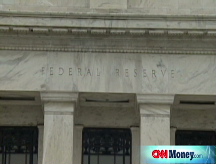Paulson taps bailout chief
Treasury reveals interim guidelines for hiring private-sector firms to help run financial rescue program and for preventing conflicts.
NEW YORK (CNNMoney.com) -- The Treasury Department on Monday sought to answer the first of many questions surrounding how it will implement the $700 billion financial rescue plan.
The department announced that Treasury Secretary Henry Paulson had appointed Neel Kashkari to oversee the Troubled Assets Relief Program and the newly created Office of Financial Stability.
Kashkari, a former executive at Goldman Sachs, is the assistant Treasury secretary for International Economics and Development. He joined Treasury in July 2006 and worked on several of Treasury's initiatives in response to the housing crisis - including the formation of the mortgage industry alliance Hope Now.
Kashkari will manage the centerpiece of one of the country's most far-reaching government interventions in the economy - purchasing and managing up to $700 billion in troubled assets to unclog the credit market.
The Treasury on Monday also released its guidelines for how it would hire firms to manage asset purchases.
It cited the need to begin the program urgently. Asset managers and other private-sector agents involved in running it may be hired "through other than full and open competition," the Treasury said in a statement.
"Given the urgent need to implement the Troubled Assets Relief Program quickly, the selection process for asset managers may involve extremely short deadlines for submitting information" and attending interviews, Treasury noted.
The department on Monday afternoon posted its help wanted notices on its Web site, detailing the eligibility requirements and other guidelines applicants must meet to be considered. The deadline for expressing interest in the job: 5 p.m. on Wednesday.
Those applicants in whom the Treasury has interest will be subject to further review in a two-stage process.
Asset managers hired to conduct transactions on behalf of the Treasury will be considered financial agents of the United States. That means they will have a fiduciary duty and "responsibility for protecting the interests of the United States."
Information on the contracts awarded to private-sector firms will be posted online at the Federal Business Opportunities Web site or at the Federal Procurement Data System site.
Still unclear from the guidelines, however, is how - and how much - the asset managers will be paid.
The interim guidelines also address conflicts of interests for those who are hired to run the program.
Applicants must disclose any actual or potential conflicts of interest and propose a way to mitigate those concerns if hired. It will be up to the Treasury officer doing the hiring to determine if the mitigation plan is adequate to the job the contractor or financial agent would be hired to perform, and to amend it if necessary. Once an applicant is hired, that mitigation plan would become a contractually binding obligation.
Before lawmakers approved the rescue plan, they included in the bill a requirement that there be two oversight committees keeping an eye on the new TARP programs Treasury puts in place.
The first, a Financial Stability Board, is made up of the Federal Reserve chairman, the Securities and Exchange Commission chairman, the Federal Home Finance Agency director, the Housing and Urban Development secretary and the Treasury secretary.
The second, a congressional oversight panel, to which the Financial Stability Board will report, will have five members appointed by House and Senate leadership from both parties. ![]()


